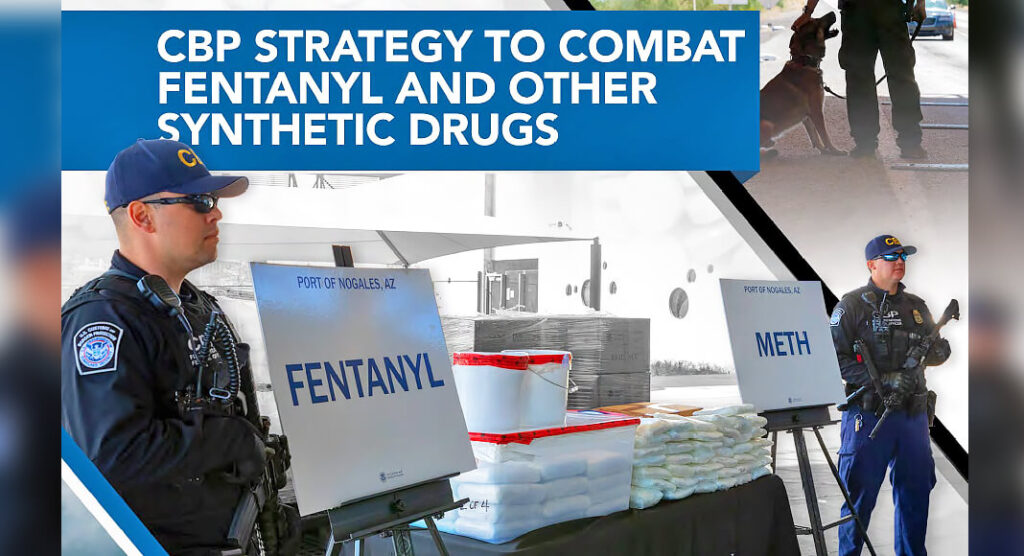
Texas Border Business
SAN DIEGO – The U.S. Department of Homeland Security’s (DHS) U.S. Customs and Border Protection (CBP), today released an updated, comprehensive approach within its mission set to continue to fight the national opioid epidemic that has killed hundreds of thousands of Americans and impacted countless lives, families, and communities. As the unified border entity under DHS, this CBP strategy complements the Department’s strategic plans, and advances President Biden’s Unity Agenda Strategy to beat the overdose epidemic.
Select document below for some important Fentanyl Facts:
Troy A. Miller, CBP’s Senior Official Performing the Duties of the Commissioner, unveiled the updated strategy alongside federal, state, and local law enforcement partners at a news conference in San Diego today. Concurrently, CBP senior leadership also led a kickoff meeting with state and local law enforcement partners for Operation Apollo, a joint regional operation that flows from the updated strategy. As the largest law enforcement agency in the United States, CBP is uniquely positioned to detect, identify, and seize illicit drugs from entering the country and preventing these deadly substances from entering our communities and taking lives.
“The Department of Homeland Security is combating the scourge of fentanyl and other illicit synthetic narcotics with every tool at our disposal,” said Secretary of Homeland Security Alejandro N. Mayorkas. “We have stopped more fentanyl in the last two years than in the previous five years combined and continue to optimize our intelligence and field operations to stop these deadly substances from hitting our streets. At the same time, we are cracking down on the ruthless cartels and criminal organizations that are responsible. CBP plays a critical role, working together with our federal, state, and local partners, and this strategy builds on the tremendous talent of a workforce fiercely dedicated to protecting the American people. The scope of the fentanyl challenge our country faces underscores the need for Congress to provide CBP with the additional resources, equipment, and personnel required to continue this critical work, as outlined in the Administration’s supplemental budget request.”
Select the document below to read the strategy to combat Fentanyl and Synthetic Drugs
“In my thirty years as a customs official, the trafficking of synthetic illicit drugs like fentanyl is one of the toughest, most daunting challenges I have ever seen. Through this updated strategy, we will channel the incredible efforts of the men and women of CBP to keep this and other drugs out of the country,” said CBP Senior Official Performing the Duties of the Commissioner Troy Miller. “CBP’s modernized Strategy brings the unique, formidable, and wide-ranging capabilities and authorities of CBP to bear on the illicit synthetic drug trade and build capacity and collaboration with our partners—domestic and international—to ensure the safety of the American people. As the nation’s frontline, CBP is uniquely positioned to lead the federal government’s efforts to combat fentanyl.”
The CBP Strategy to Combat Fentanyl and Other Synthetic Drugs, drives a whole-of-CBP approach that feeds into the work taking place all across DHS as we lead interagency efforts against illicit synthetic narcotics.
This 2023 strategy aligns resources, enhances partnerships, and builds on the successful enforcement intelligence and data-driven operations CBP has executed this year, while leveraging CBP’s vast expertise and data holdings to disrupt the transnational criminal organizations responsible for the illicit production, distribution, and trafficking of illicit fentanyl, its analogues, and other synthetic drugs in the United States. This strategy is aligned with President Biden’s National Drug Control Strategy, building on CBP’s unique customs and enforcement authorities at ports of entry and along our borders and complementing other DHS efforts including the Homeland Security Investigations (HSI) strategy to combat illicit opioids.
The updated Strategy aligns CBP’s work around four key goals:
- Promote collaboration and information-sharing to combat illicit synthetic drug networks.
- Produce actionable intelligence for targeting illicit synthetic drug networks.
- Conduct coordinated and unified intelligence and data-driven operations to target the production, trafficking, and distribution of illicit synthetic materials.
- Promote safe handling, protocols, and educational materials to protect the CBP workforce, families, and communities.
This update focuses on an ever-changing threat landscape and the proliferation of synthetic narcotics. It not only focuses on fentanyl and its analogues, but also methamphetamine and otherwise legal precursors which are increasingly being used for illicit purposes such as the production of fentanyl and its analogues.
CBP’s combination of interdiction and intelligence capabilities, complemented by its border search authorities, scientific services, non-intrusive inspection equipment, and canine detection teams, places it at the forefront of the U.S. government’s efforts to combat the fentanyl crisis. CBP will continue to collaborate with domestic and international partners to thwart the flow of illicit fentanyl by enhancing information-sharing efforts, producing actionable intelligence, targeting the synthetic supply chain, and protecting CBP’s personnel and canines from exposure to fentanyl.
As an immediate first step in implementing the updated Strategy, today CBP is also announcing Operation Apollo: a Southern California counter-fentanyl joint operation, with a focus on intelligence collection. The CBP-led operation will concentrate law enforcement efforts on disrupting drug and chemical supply, collecting and sharing intelligence, and leveraging valuable partnerships. Participating agencies, led by CBP, include state, local, and tribal law enforcement agencies and fusion centers from the initial target areas of operation in San Diego, Imperial, Orange, Los Angeles, and Riverside counties, as well as federal agencies from within DHS including Homeland Security Investigations, and other federal agencies that have a nexus to narcotics trafficking as well as the intelligence community.
CBP-led Operation Apollo will build on previous actions to further strengthen enforcement intelligence on trafficking networks in Southern California, including the routes used and their operational logistics. As synthetic drugs continue to devastate individuals across the United States, the operation will also look to uncover and better understand the tactics, techniques, and procedures utilized by transnational criminal organizations to procure, produce, store, and transport fentanyl and fentanyl-related materials throughout the country. Partners will identify key indicators that lead to information that law enforcement can act on to disrupt drug supply in American communities.
Fentanyl production was limited to China when CBP’s previous Strategy to Combat Opioids was developed in 2018. However, fentanyl production has since expanded to other source countries like Mexico and numerous transit countries around the globe, making it more challenging to stem the flow of illicit drugs into the United States. This problem is compounded by the fact that many precursors are used for legitimate purposes and may be legally imported and exported, making it difficult to disrupt the movement of these chemicals. By targeting suspicious locations and recipients that demonstrate patterns of illicit activity, CBP can disrupt the supply chain of illicit fentanyl and its analogues, methamphetamine, and other synthetic drugs.
CBP will continue to build on previous work as the frontline against fentanyl, to adapt to new changes from transnational criminal organizations, and to leverage new information. Earlier in 2023, CBP and partners announced the results of Operation Blue Lotus and Operation Four Horsemen, focused on interdicting finished fentanyl product along the Southwest border of the United States. Just last month, CBP wrapped Operation Artemis, focused on stopping precursors and other means of production from entering the United States.
In four months of operation, CBP’s Operation Artemis led to over 900 seizures, including:
- Over 13,000 pounds of fentanyl precursor chemicals,
- Over 2,590 pounds of non-fentanyl precursor chemicals
- 142 pill presses and 325 pill molds
- More than 270 pounds of fentanyl pills and powder, and more than 210 pounds of Xylazine
- More than 1,160 pounds of methamphetamine
- And over 11,230 pounds of other finished synthetic drugs
The CBP Strategy to Combat Fentanyl and Other Synthetic Drugs can be found at CBP.gov.















